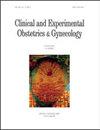沙特阿拉伯普通民众对性传播疾病的认识和态度
IF 0.6
4区 医学
Q4 OBSTETRICS & GYNECOLOGY
引用次数: 0
摘要
背景:我们的目的是确定沙特阿拉伯人口对性传播疾病(STI)的一般知识和态度水平。此外,我们的目标是让参与者了解最常见的性传播感染,并探讨这如何影响参与者的态度和看法。方法:本研究是对沙特阿拉伯一般人群进行的基于网络的横断面调查。在两个月的时间里,通过社交媒体分发调查问卷,随机招募样本。420名年龄在15-60岁之间的受试者参与了这项研究。结果:在420份回复中,405名(96%)参与者因其回答中没有缺失数据而被纳入。大多数参与者(77%)是女性。超过一半的受访者是单身(59%),24岁或以上(57%),沙特(52%),拥有学士学位(65%)。48%的参与者与医学领域有关。只有11%的人知道有人以前被诊断患有性传播感染。STI总体知识平均得分为8.79±3.17分(中位数= 9),满分为20分。分数从2-16分不等。较高比例的参与者(48.6%)的知识水平较低。有二百八十一名参与者表示有兴趣观看所附的教育材料,并随后完成了有关性传播感染教育态度的问题。在7分中,平均得分为5.89±1.52分(中位数= 6),约73%的参与者对性传播感染教育持积极态度。结论:我们的研究结果表明,通过将性传播疾病相关的教育材料纳入学校课程,针对更年轻的人群,可以通过提高对这些疾病的认识和改善对它们的态度来克服与这些疾病相关的耻辱。本文章由计算机程序翻译,如有差异,请以英文原文为准。
Knowledge and attitudes towards sexually transmitted illnesses (STIs) among the general population of Saudi Arabia
Background: We aim to determine the level of general knowledge and attitudes among the population of Saudi Arabia regarding sexually transmitted illnesses (STI). In addition, we aim to educate participants about the most common STIs, and explore how this influences the participants’ attitudes and perceptions. Methods: This study is a cross-sectional web-based survey of the general population of Saudi Arabia. The sample was enrolled randomly by distributing the survey through social media over a two-month period. 420 subjects between the ages of (15–60) participated in the study. Results: Among the 420 total responses, 405 (96%) participants were included based on the absence of missing data in their answers. Most of the participants (77%) were females. More than half of the respondents were single (59%), 24 years old or more (57%), Saudi (52%), and had a bachelor’s degree (65%). Forty-eight percent (48%) of the participants were related to the medical field. Only 11% knew someone previously diagnosed with STIs. The mean score of overall knowledge about STI was 8.79 ± 3.17 (median = 9) out of a maximum score of 20. The scores ranged from 2–16. A higher percentage of the participants (48.6%) had a low level of knowledge. Two-hundred eighty-one participants showed interest in viewing the attached educational material and subsequently completed questions on attitude regarding STI education. The mean score for attitude was 5.89 ± 1.52 out of a total of 7 (median = 6). Around 73% of all participants had a positive attitude towards STI education. Conclusion: Our findings suggest that targeting the younger population by incorporating STI-related educational material into school curricula would overcome the stigma associated with these illnesses by raising awareness and improving attitude towards them.
求助全文
通过发布文献求助,成功后即可免费获取论文全文。
去求助
来源期刊
CiteScore
0.50
自引率
0.00%
发文量
241
审稿时长
1 months
期刊介绍:
CEOG is an international, peer-reviewed, open access journal. CEOG covers all aspects of Obstetrics and Gynecology, including obstetrics, prenatal diagnosis, maternal-fetal medicine, perinatology, general gynecology, gynecologic oncology, uro-gynecology, reproductive medicine, infertility, reproductive endocrinology, sexual medicine. All submissions of cutting-edge advances of medical research in the area of women''s health worldwide are encouraged.

 求助内容:
求助内容: 应助结果提醒方式:
应助结果提醒方式:


